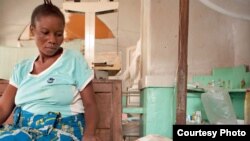Cameroonian-born Professor Rose Gana Fomban Leke, winner of the 2011 Kwame Nkrumah Award for the best female scientist in Africa, is being celebrated in Cameroon for advancing research on malaria. According to the World Health Organization (WHO), the disease remains the number one killer in Africa especially among pregnant women. The scholar has worked and published extensively on placental malaria and has broken new ground in clinical care for pregnant women suffering from the disease.
Dr. Rose Gana Fomban Leke said that, as a young secondary school (high school) student, she found that many pregnant women were dying of malaria in her community, and she nursed the ambition to one day save lives. Her efforts paid off when, after almost 100 attempts, she finally got funding for malaria research from an American university.
"I went to look for where they were doing malaria research and I went to the University of Illinois. When I returned to this country, I wrote grant [applications] to the U.S., I wrote [for] a lot of these competitive grants, finally got a good amount in collaboration with people in Georgetown University to set up a program in malaria during pregnancy," she explained.
Malaria-free
Dr. Leke founded the non-governmental organization [NGO] Cameroon Coalition Against Malaria, an organization she said aims to sound a trumpet of war against malaria and to drum out a strong message to authorities to adopt appropriate policies and effect change for a malaria free Cameroon. Dr. Leke said as a woman, she did not find it easy convincing her superiors who, for the most part were males.
"What I don't want to put in my mind is this whole thing of woman, you know, because I am a woman there. Sometimes I just keep myself like I am a human being just like the others, we are all doing work and we all move on the way the work has to go,” she said. “Because I have a feeling that sometimes if we over emphasize this thing of woman, that it is because of a woman that they treated me this way, we don't move. I think it is complementary. I sit with men, they have their own ideas, I can discuss with them at the same level."
Pace setter
Dr. Leke is today holder of several awards including the 2011 Kwame Nkrumah Award for the best female scientist in Africa. The award recognizes her contribution in malaria research and her work against the scourge, especially among pregnant women. Cameroon's Minister of Women's Empowerment and the Family, Marie Theres Abena Ondoua, describes her as a pace setter for women in Cameroon.
"She is a complete woman. When they describe what she studied, you say hey, so Cameroonian women can do this. Why do girls not go that far in certain fields? It is because they use to think that those were reserved for men. She was strong enough and she was encouraged to do it. We are no longer in the era where they use to say sciences for boys and literature for girls,” noted Abena. “Girls should know that they can go everywhere and do as much as boys."
Encouraging girls to do more
Cameroonian society is still very conservative when it comes to women's promotion and leadership. That is why some people here refer to Dr. Leke as a "man." Journalist Jessy Atogo told me she was not comfortable that. "Men have been there, they are succeeding, you know, so if a woman goes beyond where society thinks she should be then she is a man. But that is not so, I mean we can argue about this till thy kingdom come, but women when they set their minds to do anything they do it,” she stated. “Women have been empowered and endowed by God. We should acknowledge this and said I am who I am, created by God. She can never be forgotten."
Dr. Leke believes the best is yet to come for women in her country, but says they should not wait for someone else to make the good things happen. "Don't give up and devote yourself and not sit and just wait, government has not done this, my goodness. You know what are we doing ourselves in our little corners," she said ." I tell myself I have to keep going, and I think it is a lot of hard work; it is what you will term tenacity. There you work hard and you continue to do so regardless of the challenges. You just keep on going, you don't stop."
The 68 year old professor said she still has lots of ambition and listens to the song "Woman" by the Ugandan-born artist Juliana Kenyomozi for inspiration.




